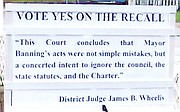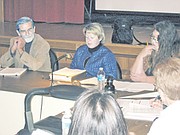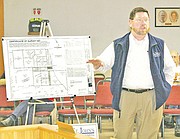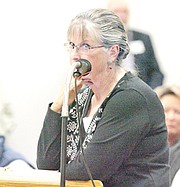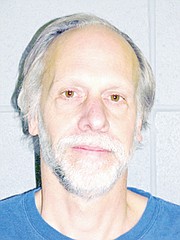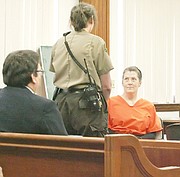The Year in Review: Top 12 of 2012
Throughout 2012, there were numerous news stories that rose above most headlines, many of which were ongoing reports. You, our readers, ranked the best and biggest stories of 2012. Here are your results.
Troy mayor recalled
Former Troy mayor Don Banning was ousted in May after a local faction followed through on a successful recall petition. The story garnered the most votes to end 2012 as the top news story of the year.
City Councilwoman Fran McCully led the charge, with Council President Phil Fisher supporting the petition.
Current city attorney, Heather McDougall, represented McCully in the effort to take down Banning.
The reasons for McCully’s actions were four-fold, alleging Banning terminated City Attorney Charles Evans without consent of the council, cashed a check for $331.80 in city money that was not approved by the council, and allowed a construction project to take place in Roosevelt Park without the council’s approval.
Banning’s attorney, James Reintsma, claimed Banning was targeted by a small political faction. Banning claimed he had acted in his power as mayor in each of the four claims against him.
Reintsma filed an affidavit on Feb. 13 at the request of Banning, petitioning for a temporary restraining order and permanent-injunctive relief.
The temporary restraining order and the permanent-injunctive relief were filed against the Lincoln County Clerk and Recorder Tammy Lauer.
The recall election was announced Feb. 7 after a recall petition, drafted by McDougall at the request of McCully, was submitted to Lauer.
In the 19th Judicial District Court here in Lincoln County, Judge James B. Wheelis decided there was enough reason for a recall election of the mayor whose term was embroiled in controversy.
Wheelis gave Banning two options: He must either resign by Thursday, March 29, or submit a written reason in 200 words or less by April 15 explaining why the process should continue with a recall election.
In the end, 60 percent of voters who returned ballots on the recall election voted to recall Banning, 190 voting for removal, 123 for retention.
The removal of Banning as a result of the mail-in balloting was immediate.
Banning, who was serving his first term as mayor, also served the city as councilman.
Tony Brown was voted in to fill the rest of Banning’s term, and Evans was reappointed as city attorney, only to resign a month later and McDougall was appointed on a controversial vote to be the city’s new attorney.
Schools seek mill levy
Libby School District 4 Board members during their Nov. 12 board meeting voted without dissent to ask residents during the May 7 election for a $350,000 tax increase to further fund the district.
The last successful mill-levy request came in 2002, which will be 11 years by the time the vote is taken in five months.
The motion to proceed with the mill-levy request was made by Board Member Les Nelson and seconded by Amy Fantozzi. Affirming the vote were board members Bruce Sickler, Lori Benson and Melissa LaGoy. Board member Ellen Johnston was not present.
The resolution also authorized the election for the purpose of filling the seats of Board President Tracy Comeau and Nelson, both of whom have yet to indicate whether they will seek re-election.
During that meeting, board members expressed an interest in beginning as soon as possible in establishing a political action committee to urge the passage of the levy. Subsequently, Tommy Cook, a project manager for an engineering firm, has stepped forward and has agreed to accept the chairmanship of the PAC.
During that meeting, Maki presented a 2013-14 budget forecast that included a $779,317 shortfall, of which $610,317 can be attributed to declining enrollment and compensation for those students from the state. Another $169,000 is estimated of the cost of steps and lanes, which are pay increases for district staff.
Variables to whittle the $779,317 figure include a possible 0.89 percent funding increase from the state, which amounts to $65,000, energy savings of $10,000 from more efficient windows and a new boiler system, and $235,000 from staff reductions of four to five people, bringing the total to $469,000.
If the district can get staff to forgive the steps and lanes increases, the figure drops to $300,000. It was that figure that Board President Comeau estimated was cutting the budget too close. It’s for that reason, Comeau, an accountant, and the Budget Committee recommended the $350,000 mill-levy request.
Since 2002, several attempts for a mill levy and a bond issue have failed.
The current budget for the district is $9.3 million annually, but that figure is less than previous years.
It has come down with the consolidation of campuses, said Nelson, a member of the Budget Committee.
Hotel Libby status
From a dilapidated shell on California Avenue, Hotel Libby has taken leaps and bounds to reclaim its past glory, headed by Hotel Libby project manager Gail Burger.
One of Libby’s most prominent landmarks is on its way to total renovation after years of neglect and an EPA overhaul.
The hotel, across the street from the offices of The Western News, sat empty for the better part of three decades as no one could figure out what to do with it.
Burger, who grew up in the hotel when her family bought it in 1977, decided to change that, and has a five-year plan for total renovation and a grand reopening.
In September Burger received word the hotel had been approved for a grant and would be on its way to a working hotel.
It was a notification from the National Park Service that Hotel Libby had been officially listed on the National Register of Historic Places, making it a protected property and available for renovation and rehabilitation grants.
“When I read the email I said ‘this is fabulous,’ and I did a happy dance,” Burger laughed. “I immediately called everyone to let them know.”
Hotel Libby is actually listed under its original name in the National Register of Historic Places, “The Coram.” It was named after its original owner and builder, J.A. Coram, who left it unfinished and skeletal for 12 years. Coram was a venture capitalist from Boston who invested heavily in Montana projects. Coram’s partners, Frank M. Leonard and A.J. Maltman bought into the project in 1899 for a total of $15,000.
The mining industry buckled at the turn of the century and investors panicked, causing Coram to leave the building unfinished.
The hotel has since hosted a Halloween party and has been selected as the location for a horror film to shoot in February.
CVFSA Dissolution
In what was the most protracted and, perhaps, the most divisive and volatile news story of 2012, Lincoln County Commissioners unanimously voted to dissolve the Cabinet View Fire Service Area.
At issue, was self-governance, a right the CVFSA thought was their own.
However, 20th Judicial District Judge C.B. McNeil interpreted Montana Code Annotated differently. McNeil in June rendered a decision from the Lake County Courthouse concerning the expansion of services within their areas clearly in favor of Lincoln County.
The county had argued that the CVFSA lacked proper certification to self-dispatch and was operating outside the scope of its charter.
In June, McNeil issued a judgment against CVFSA and Bull Lake Fire District that affirmed Lincoln County’s authority to determine the scope of services. Both departments sued the county, Sheriff Roby Bowe, Troy Area Dispatch Board, Libby Volunteer Fire Department and Libby Volunteer Ambulance challenging the authority against self-governance.
The decision required the CVFSA to stay within its juridiction when fighting structure fires. It had been responding to broader emergencies.
In the judgment issued by McNeil, who heard the case at the urging of the Board of Trustees of CVFSA, that a decision come from outside Lincoln County, it was decided the Lincoln County Commissioners do have the right to decide services fire agencies may provide, and thus the protracted legal battle to fight dissolution was on.
What followed was a lawsuit, countersuit and a CVFSA petition drive that sought to stave off dissolution.
A petition drive that included 60 pages and 232 signatures fell short of the required number of real property owners.
In the end, and just last week, two former CVFSA board members, William Clark and Robert Mast, withdrew their lawsuit in concession that their petition drive simply lacked the required number of signatures to fight off dissolution.
Stinger Welding
Stinger Welding, Inc., the span and bridge builder with sites in Libby and Coolidge, Ariz., was another ongoing story during 2012.
This year, Stinger made news for obtaining large bridge-building contracts, tax liens, ending medical benefits for employees and for slow payment to creditors. As money became tight, the company experienced federal liens for non-payment of withholding taxes, overdue payment to a steel supplier and in the process cut health benefits to its estimated 65 employees.
Then, on the verge of the holidays, its CEO and driving force of the company, Carl James Douglas, 54, crashed his twin-engine turbo-prop Beechcraft King Air into Swede Mountain on Dec. 19.
Stinger, which came to Libby with so much hope and fanfare in a partnership with the Lincoln County Port Authority that saw an infusion of $17 million in cash, grants and credits, had experienced yet another setback. Since, it has been beset with the liens and lawsuits from the Port Authority and, most recently, a supplier of steel.
What lies ahead for Stinger Welding in 2013 will determine on how its business partner Fisher Sand & Gravel reacts to the events that made Stinger the fifth biggest story in 2012.
Sam Haley Rose
Libby came to know one of the most outspoken critics of the Montanore Mine project as Sam Haley Rose, and later came to know him as a felon.
In a story that spanned much of 2011 and rolled well into 2012, Rose, who was known previously as Harry Paul Mottsman, was co-founder of Alternative One, an anti-Montanore Mine group.
In a bizarre twist that baffled many, Rose walked into the Lincoln County Sheriff’s Department seeking to file charges against Montanore. Instead, Rose was arrested Wednesday, Nov. 30, 2011, for an outstanding warrant in Flathead County for allegedly forging checks.
In 2009, Rose was wanted for allegedly forging two checks in Flathead County for a total amount of $7,416. He and his wife Lynne Haley Rose lived up near the mine site, and mostly kept quiet in the beginning. But during a Montanore rally in 2011 at the Chamber of Commerce parking lot, the public put faces to the outspoken Roses.
What followed was deriding dialogue against the project both online and through letters.
When Rose walked into the Sheriff’s Department, he was apprehended and spent time in the Flathead County Jail. He subsequently made bail and fled. He later was picked up by a bail bond bounty hunter as he tried to meet a woman he met online at the Cheesecake Factory in Boise, Idaho.
According to Lincoln County Sheriff Roby Bowe, Mottsman has used alias names throughout the U.S. — Virginia, Pennsylvania, Vermont and New Hampshire. Mottsman allegedly has used alias names “Dave Griffin,” “Harold P. Mattsman,” “Sam Alexander Rose” and “Sam Haley Rose.”
Rose originally faced up to 20 years in jail and a fine of up to $50,000.
Mort Curtiss
Mort Curtiss, the Libby High School teacher terminated Sept. 19, 2011, after he was arrested for allegedly distributing prescription drugs, was reinstated after meeting all pre-trial diversion and subsequent agreements.
Curtiss was back on the payroll Dec. 7. He likely will not teach a class until next semester, which resumes next week.
Curtiss was first suspended, and then terminated, after the Lincoln County Sheriff’s Department charged him with sharing small amounts of prescription drugs, including marijuana, at the Libby Elks Lodge in March 2011.
Curtiss had prescriptions for both, and shared them with a consenting adult. All charges were dismissed after Curtiss fulfilled his legal obligations.
For two years after being reinstated, the school district will have the right to randomly drug test Curtiss not more than once a month.
“If the grievant is tested positive for either drugs or alcohol during the instructional day, such a positive test is grounds for immediate termination,” reads the arbitration.
The second stipulation to Curtiss’ reinstatement is he must advise Superintendant K.W. Maki in writing within one week of reinstatement of all prescription drugs that he is currently taking and, for the next two years, will immediately update that list should any changes happen.
Despite the monitoring, Curtiss is relieved to have his job back.
“I feel good about it,” he said. “I could be bitter about it, but I don’t want to.”
Maki, when asked whether there might be any negative reaction to Curtiss going back to work, offered a terse “possibly.”
Libby Schools is facing a budget shortfall, and is planning to layoff five teachers next year. If the proposed mill levy fails, that number could rise to 10.
Kristina Welch
The case of Kristina Lynn Welch, charged with the murder of her husband, Charles Bryan Welch, Dec. 7, 2011, reached a key juncture in December.
After 19th Judicial District Court Judge James B. Wheelis rejected an initial plea agreement that limited his ability to set sentencing, Kristina Lynn Welch agreed to plead guilty Dec. 17 to negligent homicide in the shooting death of her husband.
To obtain a guilty plea, Lincoln County Attorney Bernie Cassidy agreed to dismiss deliberate homicide charges against Welch, who had spent every night in the Lincoln County Jail since being arrested on Dec. 8, 2011.
Welch attorney Jennifer Streano initially presented a plea-bargain agreement that would have given Welch credit for time served in the Lincoln County Jail. It also would have suspended 17 years of the maximum 20-year sentence for good behavior, meaning she could have served as little as three years for the death of her husband.
However, Wheelis would have none of that, rejecting the bargained plea.
Cassidy agreed to withdraw the prosecution’s acceptance of the agreement. Wheelis set sentencing for 1:30 p.m. Thursday, Feb. 28.
SJLH Breaks Ground
In front of a backdrop of earth-moving excavators that have been bustling for nearly two weeks, St. John’s Lutheran Hospital officials on Friday, Oct. 12, broke ground, formally kicking off the much-anticipated new phase in the medical facility’s 60-year history.
The groundbreaking for the $35 million, 77,000-square foot facility was well-attended, attracting an estimated 80 people, many of whom were hospital dignitaries, members of the SJLH Board of Trustees and of the Hospital Foundation, which is crucial in the ongoing fundraising effort.
Foundation members presented SJLH CEO and CFO Bruce Whitfield an oversized check for $1.198 million, which represents a down payment. A little more than $200,000 additional funding has been pledged.
Financing for the project was secured in June, garnering a 3.58 percent interest rate, which is better than the 5.5 percent rate anticipated.
The lower rate will save the hospital an estimated $10.4 million in interest during the course of the loan payment.
The ceremony was a festive affair, as attendees were given replica yellow hard hats as they entered. A beautifully decorated cake with images of past projects from SJLH’s beginning in 1952, additions in 1983 and 2002 were depicted in the icing.
SJLH Director of Marketing KC Hoyer served as emcee, making introductions of the board and foundation before handing off the microphone for the actual ground breaking.
The new facility will more than double the size of the current hospital, which is 56,000 square feet. While the hospital is seeking about $32 million for its loan, only about $22 million are for bricks and mortar. The remaining funding is for upgrades to the facility.
Kinniburgh Murder-Suicide
In the early morning hours of Tuesday, Jan 4, two individuals were pronounced dead after an eight-hour standoff with Lincoln County law enforcement.
Then, it was still unclear what took place in the Kinniburgh home, located at 1217 Main Ave., in Libby — resulting in what later was determined to be a murder-suicide.
A 911 call was made by Dale Kinniburgh Jr., 51, at 6:28 a.m. Tuesday, Jan. 4, telling authorities he had killed his wife, Catherine Kinniburgh, 55, and was planning to kill himself.
What followed was an eight-hour standoff, as police carefully planned to enter the home. Homes in the surrounding blocks were evacuated. Kinniburgh killed himself with a gunshot.
In the days that followed, the home was burglarized — twice — by two men who were charged in the burglary.
The burglary was discovered by the Kinniburgh children who were in town to settle the estate.
Riverfront Park Rebirth/Vets
With city officials planting trees in the reclaimed Riverfront Park, the tranquility remained for less than a month before being shattered by dissenting points of view in city politics.
The Lincoln County Veterans Memorial Foundation Committee began its campaign to have a memorial in the park in July, but there was some resistance from city officials who wanted to preserve green space instead of making the memorial a centerpiece of the park. The saga continued through the end of the year.
Libby City Council members unanimously approved a resolution that will, in principle, place the Veterans Memorial at Riverfront Park.
The veterans have nearly fulfilled the city’s mandate to begin work on the project, the last piece being a legal entity as recognized by the state.
The veterans seek to erect a bronze statue of a World War II-Korean War-era soldier pulling a more modern-equipped soldier to safety. The veterans have commissioned local sculptor Scott Lennard to construct the bronze, which they hope to dedicate Veterans Day 2014.
Proposed Sawmill
Kootenai River Development Council of Libby in November received a $17,800 grant from the Big Sky Economic Development Trust Fund of the Montana Department of Commerce for the purpose of bringing a sawmill to Libby.
The grant request was written by Paul Rumelhart, the KRDC’s executive director.
The agency received the funding to complete a conceptual and schematic design for the installation of the small-band sawmill capable of processing large-diameter timber.
According to the funding request, the mill would be located in the Kootenai Business Park, and once developed, would bring five new jobs, according to the application.
The mill is the brainchild of John Guiliani, a Montana native, who is CEO of Montana Timber Products of Anaconda.
The mill could be in operation by April.













